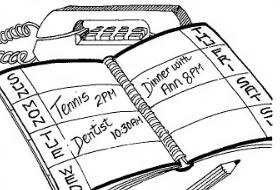Present tenses (I am doing /I do) with a future meaning в английском языке
 Present continuous with a future meaning
Present continuous with a future meaning
Study this example situation:
|
This is Tom's schedule for next week. He is playing tennis on Monday afternoon. He is going to the dentist on Tuesday morning. He is having dinner with Ann on Friday. In all these examples, Tom has already decided and arranged to do these things. |

|
When you are talking about what you have already arranged to do, use the present continuous (I am doing). Do not use the simple present (I do).
B: I'm going to the theater, (not I go)
B: Yes, but Tom isn't playing. He hurt his leg.
B: Oh, is she? What time is she arriving?
A: At 10:15.
B: Are you meeting her at the station?
A: I can't. I'm working tomorrow morning.
It is also possible to use going to (do) in these sentences:
But the present continuous is usually more natural when you are talking about arrangements.
Do not use will to talk about what you have already arranged to do:
For will see this.
 Simple present with a future meaning
Simple present with a future meaning
We use the simple present when we are talking about timetables, schedules, etc. (for example, public transportation, movies):
But we do not usually use the simple present for personal arrangements: